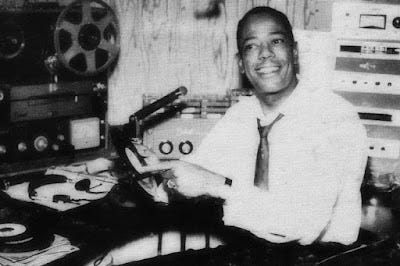Jocko Henderson Taught Students Through Rap Before Rap Took Off

Jocko Henderson was a rapper long before the birth of hip hop—and he used that skill to teach kids.
by Rich Watson
Douglas Henderson, better known to radio listeners as Jocko, was a star deejay in both Philadelphia and New York during the early days of rock and roll. He was known for a routine not unlike rap. He is credited as one of the first rappers, a man who influenced a number of early hip-hoppers in the late seventies.
It was a style that served him later in life when he taught schoolchildren.
Jocko Henderson: the Ace from Outer Space
Long before the Electrifying Mojo, Henderson’s shtick as a deejay involved outer space. In the fifties and sixties, on Philadelphia stations WHAT and later, WDAS, “Jocko’s Rocket Ship Show” played up the space angle. In live events, he would enter dangling from wires on a faux rocketship, in costume.
More importantly, he played early rock music. No less an authority than Dick Clark has cited Henderson as someone imitated by subsequent deejays.
His patter sounds quaint today in comparison to modern hip-hoppers—nonsense words rhyming with phrases praising himself and his show—but at the time, it was distinctive. The Baltimore native got it from a Baltimore jock, Maurice “Hot Rod” Hulbert, and made it his own.
In later years, he actually made some early rap records. He even tried running for the US House of Representatives in Pennsylvania. He also appeared on New York television.
His venture into education, though, endeared him to younger generations.
Jocko in the classroom
Henderson’s parents were teachers. In 1980, around the same time Schoolhouse Rock used music to teach on Saturday morning television, Henderson co-developed a unique history lesson involving his brand of hip-hop.
Along with Social Studies teacher Dr. George French, he wrote a rap about the history of the American Revolution. He employed it at FitzSimons Junior High in Philadelphia with the support of principal Harold Adams and school board member Augustus Baxter.
In a Philadelphia Tribune article, Adams called Henderson’s rap “a motivational aid which helps [students] to retain information right away although they are not studying it.”
The rap was a success. To quote Henderson from the same article:
Each and everyone of these pupils know this song by heart and have memorized the facts…. I am hoping this method can be used and expanded throughout the school district[.]
In 1985, Henderson expanded his educational raps to include black history.
By 1993, he had produced a series of cassette tapes featuring his math and history raps called Get Ready. He partnered with singer Dionne Warwick to promote them in infomercials. Ed Bradley did a story on them for 60 Minutes.
Henderson died in 2000. The Broadcast Pioneers off Philadelphia inducted them into their Hall of Fame in 2004. He is fondly remembered as an influential deejay in Philadelphia as well as New York and an entrepreneur who believed in rap as a means to entertain as well as educate.
————————
Old New York amusement parks—beginning May 10.


